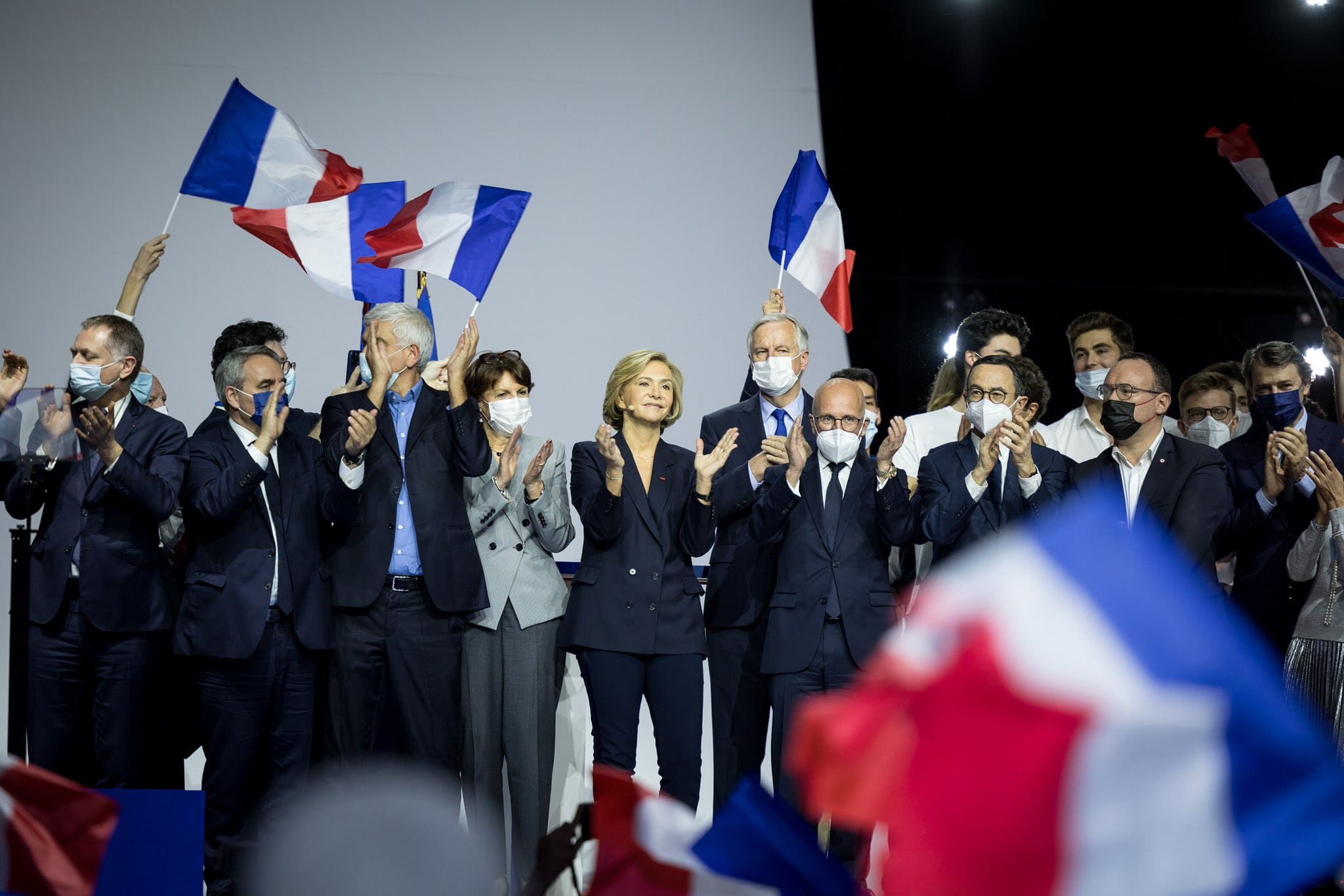
The campaign launch rally of Valérie Pécresse, the candidate of the right-wing and centre-right party Les Républicains, was held on Sunday, the 13th of February in Paris. The candidate arrived on the scene after a delay, behind her two main competitors on the Right: both held their meetings well before her, on December 5th for Éric Zemmour, and on February 5th for Marine Le Pen.
The pressure was firmly on her shoulders, since the polls show a drop in popularity, apparently benefiting Éric Zemmour. When she announced her candidacy, Valérie Pécresse seemed to benefit from a sort of state of grace, which gave her every hope of potentially challenging the outgoing president Emmanuel Macron. But her favourable position was short-lived. Like Marine Le Pen, Valérie Pécresse also faces departures from her party to the opposition—this time, departures to Emmanuel Macron’s party, such as that of Éric Woerth, former budget minister of Nicolas Sarkozy. But Valérie Pécresse intends to turn her uncomfortable position into a strength. She even takes pride in it, according to an interview with the Journal du Dimanche: “I am the woman to be shot. All the blows are focused on me: those of the Macronie as well as those of Éric Zemmour and Marine Le Pen. I am a political danger because I am the only one who represents a serious alternative to Emmanuel Macron. But I say it to all those who shoot me in the back: I am a conqueror.”
Valérie Pécresse gathered her activists—around 6,000 participants—and the meeting played out its agenda: to mobilise her party, allowing the candidate to speak and have her main supporters by her side, such as her unsuccessful rival in the primary Xavier Bertrand.
La nouvelle France, c’est le nom d’une promesse, celle d’aimer la France de toutes nos forces. Contre les extrémistes, choisissez la main ferme et juste. Contre l’immobilisme, choisissez l’action. La France demande du courage. Ce courage, je l’ai ! 🇫🇷 #NouvelleFrance pic.twitter.com/Yd48Xx7Nmv
— Valérie Pécresse (@vpecresse) February 13, 2022
Despite the fanfare, the candidate’s performance was the subject of much criticism. Political commentators severely judged her speech for sounding pretentious, full of easy platitudes, and incapable of generating genuine enthusiasm in the Zenith hall in Paris. The videos circulating of her speech show a woman who is not entirely comfortable speaking to crowds—in stark contrast to the performances of Éric Zemmour and Marine Le Pen the week earlier in their Lille and Reims rallies. Criticism spread even to Valérie Pécresse’s own camp. “But what’s going on?” asked Nadine Morano, the candidate’s international adviser, worriedly. “It was a shipwreck,” explained one of the party’s executives on BFM TV.
The form was displeasing, and there was a lot of criticism about her basic lack of mastery of the art of oratory, which gave to her speech a tone of artificiality. But the controversy also focuses on the substance. At one point in her argument, Pécresse used expressions popularised by Éric Zemmour, “grand déclassement” and “grand remplacement.” Her intention was to criticise these terms and to explain that France should not be satisfied with them, but the objective was missed. On the Left, Valérie Pécresse was criticised for having adopted the polemicist’s sulphurous terms; on the Right, Zemmour’s supporters saw proof of their candidate’s ideological superiority and of Valérie Pécresse’s weakness in taking up the terms of the debate imposed by her rival.
These numerous criticisms forced the candidate to react in the media immediately, Monday morning, February 14th. She owned the weakness of her performance, but explained that she was not there to make oratory effects, but to be ‘in action.’ She also returned to the expressions borrowed from Zemmour, which, she explained, she used to underline her condemnation of the polemicist’s diagnosis.
The question that now arises pertains to the consequences of this meeting. Will it have a visibly negative effect on voting intentions? Will it accelerate the disaffection of her camp towards Emmanuel Macron as well as towards the national Right of Éric Zemmour and Marine Le Pen? Whatever the fallout may be, both Zemmour and Le Pen are multiplying signals to recover a governmental right-wing electorate that may doubt the candidate’s ability to impose herself as the main opponent of Emmanuel Macron. At this stage of the campaign, only 46% of the French are sure of their choice for the first round of the presidential election. A candidate’s ability to win tends to prevail as a criterion of choice—higher than ideological positioning.
